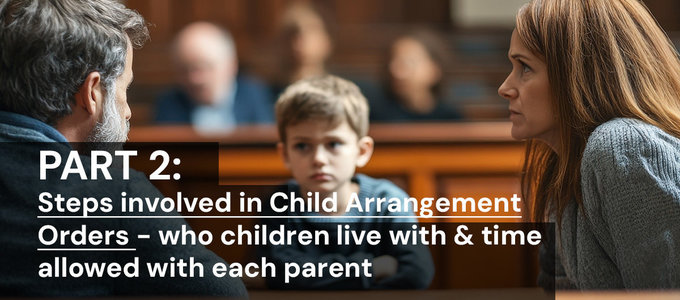Part 2: 'Children Act' Series - Procedure

Starting Child Arrangement Proceedings
Navigating the complexities of child arrangement proceedings can be daunting for any parent. This guide aims to provide a clear and concise overview of the steps involved in starting child arrangement proceedings in.
Securing a Child Arrangement Order.
The goal of commencing child arrangement proceeding is to secure a Child Arrangement Order. This is a legal document issued by the Family Court that outlines the living and contact arrangements for a child. Most importantly that who the child will live with and how much time they will spend with each parent or guardian.
When to Consider a Child Arrangement Order
Parents should always aim to reach an agreement between themselves, if possible. It is always better to reach an agreement outside of the Court. Even if it requires compromises, you will compromise on your own terms rather than a Judge imposes a decision on you. Having said that, there are sadly many times when the parties simply cannot see eye to eye, and they left with no alternative but to commence proceedings. Child Arrangement Order can provide a structured framework to ensure the child's best interests are met, reducing conflicts and providing a stable environment for the child.
Steps to Start Child Arrangement Proceedings
-
Attempt Mediation: As mentioned above, it is always better to reach an agreement outside of Court. The Court itself encourages the same. Therefore, before applying to the court, you must attend a Mediation Information and Assessment Meeting (MIAM). This meeting aims to explore if the dispute can be resolved through mediation, which is often quicker and less stressful than court proceedings.
-
Complete the Application Form: If mediation is unsuccessful, you will need to complete the C100 form to apply for a Child Arrangement Order. This form can be filled out online or on paper.
-
Submit the Application: Submit the completed C100 form to your local family court. You will need to provide three copies of each document if submitting by post.
-
Pay the Court Fee: The initial court fee for applying for a Child Arrangement Order is £215. Additional costs may arise if further hearings or specialised reports are needed.
-
Safeguarding Checks: Once the application is submitted, CAFCASS will conduct safeguarding checks to ensure the child's safety. Children and Family Court Advisory and Support Service (Cafcass) is an independent body whose primary duty is to the children to represent their interest and protect their physical and mental wellbeing. Cafcass officers are trained professionals, typically with a background in social work, and they are experts in child welfare and family dynamics.
When an application is issued, the Court directs Cafcass to conduct initial safeguarding checks. This involves checking with local authorities for any history of social services involvement with the family and requesting and reviewing police records to identify any history of criminal activity or domestic abuse. As part of the safeguarding process, Cafcass officers will conduct interviews with each parent. Following this, a Safeguarding Letter will be prepared for the Judge’s consideration.
-
First Hearing Dispute Resolution Appointment (FHDRA): The first court hearing is called the FHDRA. The court will consider the safeguarding information and encourage both parties to reach an agreement. If an agreement is reached, the court may issue a final order.
-
Further Hearings: If an agreement is not reached at the FHDRA, the court may schedule further hearings to resolve the dispute. The court will make directions to progress the case or prepare it for a fuller hearing
Starting child arrangement proceedings can be a challenging process, but understanding the steps involved can help you navigate it more confidently. Always remember, it is extremely important that the child has a good relationship with both parent and the goal is to ensure the best possible outcome for your child.
If you believe you have a situation where you require legal advice, please contact us on telephone 0116 212 1000 or 0 116 212 1066, alternatively fill in the free Contact Us form and we will get in touch as soon as possible.
View all

